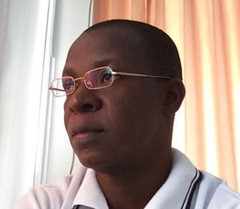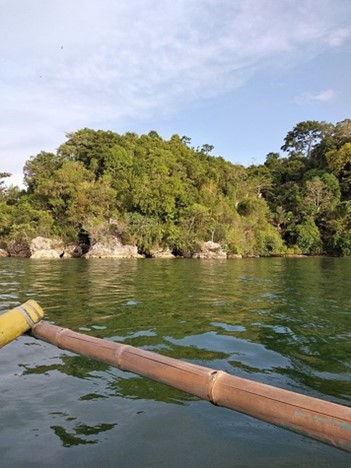In this instalment of the DPRU's Q&A series with death penalty experts from around the world, Ajeng Larasati, Human Rights Lead at Harm Reduction International, tells DPRU Research Officer Jocelyn Hutton about her work advocating for justice for drug offenders worldwide.
Can you tell us a little bit about your current work?
I lead the Human Rights and Justice Team at Harm Reduction International (HRI), where one of our main focuses is advocating against the use of the death penalty for drug offences. We monitor global use of the death penalty for drug offences and use our findings to campaign for the abolition of the death penalty for drug offences. We regularly brief UN member states, agencies and other relevant actors with updates and policy briefs, and we liaise with NGOs working in countries that retain the death penalty for drug offences.
Can you talk about one of the most interesting/compelling cases you’ve ever dealt with?
To me, each and every death penalty case is interesting and compelling. But one case that I will always remember is that of Humphrey Jefferson Ejike, or, as we called him, Jeff. Jeff was a Nigerian citizen who owned a restaurant in Jakarta, Indonesia and was framed for drug trafficking by a business rival. The police raided his restaurant and found 1.7kg of heroin that had likely been planted there. Jeff was sentenced to death in 2003.
There were many allegations of racial discrimination in Jeff’s case. The District Court even stated that “black people from Nigeria often become a police target for surveillance due to their suspected involvement in drug dealing”. Jeff was reportedly tortured during detention and told he could be released if he would name another ‘African’ man instead. There is also evidence that the man who framed Jeff later admitted to this on his deathbed, and yet none of these facts were taken into consideration.

Jeff was my first death row client when I worked at Lembaga Bantuan Hukum Masyarakat (LBHM), an Indonesian legal aid organisation. His case was referred to us quite late in the process and so we were left with limited further legal avenues to help him. I met him in prison a few times before he was executed. He sent us a few warming letters encouraging us to keep up the good work and to not lose hope. Jeff was executed on 29 July 2016 – along with three other people, two of whom were also Nigerian – while his case was in the process of a clemency application, which should legally stay the process. Sadly, I was out of the country and I didn’t have a chance to say goodbye. The Indonesian Ombudsman has now admitted that Jeff’s execution should not have taken place on a number of maladministration grounds.
Do you think the death penalty should ever apply in a drugs case?
Firstly, as a firm supporter of the abolition of the death penalty, I think the death penalty should never be applied in any case as it is a violation of the right to life. However, even in countries that have not abolished the death penalty, its application is meant to be limited to the most serious crimes,[i] and drug offences do not meet this threshold.
Furthermore, studies have shown that the death penalty does not deter crime, whether drug offences, or other offences. HRI’s Global Overview 2021 shows no reduction in the number of death sentences for drug offences. We have also found that it disproportionately affects the most marginalised groups and that most of those sentenced to death for drug offences across the world are coerced, tricked or trapped into smuggling drugs. Finally, execution is costly. In Indonesia, it costs the government around 200m IDR (13,400 USD) to execute one person. There are many more effective uses for that money, which could be used to solve problems rather than exacerbating them.
Why do you think foreign nationals are at special risk of the death penalty in drug cases?
When I have assisted foreign nationals in Indonesian courts, I have seen the layers of vulnerability and discrimination that they experience from the moment they are arrested. Foreign nationals often find themselves unable to communicate and explain their situation to the police and the police almost never have a translator with them when they arrest someone. In many cases, foreigners do not know how to contact lawyers or translators, so they are often at the mercy of the police. It often takes time for the relevant embassy to be informed and sadly, not every embassy is able to provide help. Without translators and lawyers, it is almost impossible for the foreigner to defend themselves and give their testimony during the investigation process or during court hearings. Foreign prisoners are also vulnerable to torture and extortion. In the corrupt criminal justice system Western prisoners are treated like an ATM machine – where police can extort them for money – as they are perceived as ‘rich people’. And foreigners who don’t have such resources are not able to buy their way out of their vulnerabilities. All foreign nationals have to face these things without being able to communicate with their families back home, or any help from their support systems.

Many people on death row are held on Nusakambangan Island in Central Java province. It is very difficult to visit anyone imprisoned on that island, both in terms of authorisation and logistics. This makes it even harder for family members or consulate authorities to offer their support to prisoners. Those that do make it will have to travel for hours, using multiple forms of transport for a very short visitation. As in many other prisons in Indonesia, the conditions inside Nusakambangan are inhumane – basic services are limited, there is huge overcrowding and the Indonesian Ombudsman found that the food and health budgets came to only 1 USD and 2 USD per person per day, respectively.
What is one of the biggest issues facing foreign nationals accused of a death penalty crime?
The lack of appropriate language translators really impacts foreign nationals. I don’t think finding a translator who can speak the language is enough. There is a responsibility to find a translator who understands the context – and this is what is usually missing. Complex legal terms need proper translation and interpretation. Prisoners’ intentions and reactions need to be properly construed. Misinterpretation often takes place – even for basic terms. For example, one of our clients when sentenced to death was asked to respond by the court. She said she felt speechless and numb as she was stunned by the injustice of her situation. The court translator conveyed this as unfeeling and therefore she was portrayed as a cold, heartless criminal in media coverage of the case.
What do you think is the most effective way of lobbying against the death penalty?
I wish I knew the right answer to this question. Pragmatically, think what matters most are the message and the messenger. The message will need to hit something that policymakers care about, even if it is not what we might think is the main point. Similarly, sometimes the most effective messenger is not always the people with expertise. It could be local or religious leaders, artists/celebrities, or people with power and resources.
Finally, you just have to keep trying. Lobbying against the death penalty, as with any other human rights advocacy, is a marathon. You need constant stamina, human and financial resources, and patience to see it through.
 |
Ajeng Larasati is a human rights and public health specialist from Indonesia. She works at Harm Reduction International (HRI). HRI aim to reduce the negative health, social and legal impacts associated with drug use and policy and advocate for those sentenced to death for drug offences. Ajeng also coordinates the Lawyering on the Margins Network and sits on the boards of the HIV Justice Network, the Indonesian legal aid organisation Lembaga Bantuan Hukum Masyarakat (LBHM) and the Indonesian sex workers' network Organisasi Perubahan Sosial Indonesia (OPSI). |
[i] Article 6(2) of the International Covenant on Civil and Political Rights (ICCPR) states that: “In countries which have not abolished the death penalty, sentence of death may be imposed only for the most serious crimes …”. The UN Human Rights Committee has stated that ‘most serious crimes’ should be interpreted restrictively to mean only those crimes resulting directly and intentionally in death, excluding drug offences. See e.g. UN Human Rights Committee, ‘General comment No. 36: Article 6: Right to life’ (3 September 2019) UN Doc CCPR/C/GC/36, para 35.
Share:
